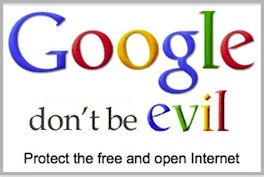-
New Net Neutrality Ad Campaign Draws in Google's Co-Founders
When it comes to net neutrality, I've learned to expect the unexpected, as any sense of a formal process was long-ago abandoned in favor of an ad hoc free-for-all by interested parties. That was epitomized by the recent partnership between Google and Verizon which joined up to go rogue by proposing their own net neutrality recommendations in August. Though they thought they were moving the ball forward on the issue, they were promptly scorched by net neutrality advocates for endorsing vague private Internet lanes and exempting wireless from any new regulations.
Now the latest chapter in the net neutrality battle is unfolding with an online ad campaign, featuring an online petition directed to Google's co-founders Sergey Brin and Larry Page, to live up to Google's corporate motto "don't be evil" by walking away from the Verizon deal. The campaign is funded by the Progressive Change Campaign Committee and other advocacy groups like MoveOn and Free Press. The petition's web site states that over 334,000 people have signed on so far. Ironically the ads are being bought through Google itself, and on Facebook.
Sergey Brin and Larry Page, to live up to Google's corporate motto "don't be evil" by walking away from the Verizon deal. The campaign is funded by the Progressive Change Campaign Committee and other advocacy groups like MoveOn and Free Press. The petition's web site states that over 334,000 people have signed on so far. Ironically the ads are being bought through Google itself, and on Facebook.
The ads are a PR sideshow that the company could have easily avoided by offering a more coherent proposal. As I wrote at the time "Google and Verizon Net Neutrality Proposal Comes With Big Loopholes," the notion of allowing an unregulated "third tier" or "private Internet" plays right into net neutrality advocates' concerns that the big boys are rigging the game in their favor. At a time when people were looking for regulatory precision, Google and Verizon instead offered up massive ambiguity.
Similarly, the exemption for wireless was ill-timed and seemingly self-serving. With millions of iPhones, iPads and Android devices being sold and video apps in the middle of the action, people are more attuned than ever to the idea that the Internet is going mobile and that these devices will be key to the future entertainment experience. Though wireless delivery is indeed in an earlier state of its technical evolution than online (the argument Google and Verizon made for its exemption), the distinction feels artificial. And since Verizon is such a large mobile carrier itself and Android is a key element of its smartphone strategy, by endorsing the wireless exemption Google set itself up to look like it was prioritizing its business partner's interests over its users' interests.
Regardless of how many people sign the petition, I think it's doubtful that Google will do anything directly in response to it, since that would be a big about face for the company. However, this whole episode was largely avoidable if Google had been more proactive in anticipating the reactions to its joint proposal. It's unclear what Brin's and Page's roles were in the planning process, but now with this new campaign underway, they are right in the middle of the debate. If or how they choose to respond will be the next chapter in the highly unpredictable net neutrality battle.
What do you think? Post a comment now (no sign-in required).
Categories: Broadband ISPs, Regulation, Telcos

